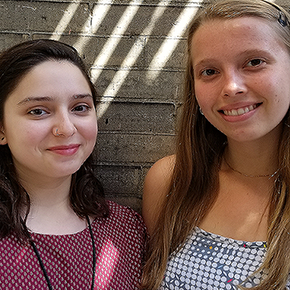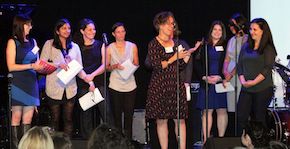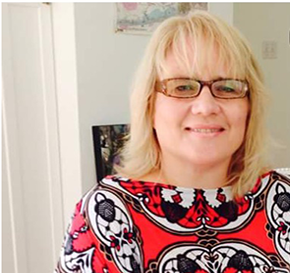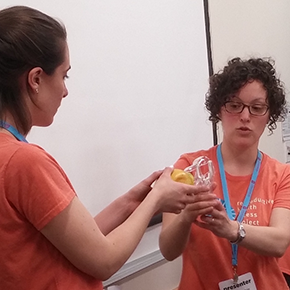Nov 06

Help Us Protect Access to Sexual and Reproductive Health Care Today!
 The Reproductive Health Access Project has had the wonderful opportunity to expand our team by two! With our new program associate and Reproductive Rights Activist Service Corps (RRASC) summer intern, RHAP’s ability to approach and fulfill our mission is growing in both capacity and experience. Get to know our new team members:
The Reproductive Health Access Project has had the wonderful opportunity to expand our team by two! With our new program associate and Reproductive Rights Activist Service Corps (RRASC) summer intern, RHAP’s ability to approach and fulfill our mission is growing in both capacity and experience. Get to know our new team members:
Natalie Kopke, Program Associate
Natalie earned a B.A. from Vassar in Science, Technology, and Society Studies and Hispanic Studies. Her passion for reproductive justice was fueled by her work with on and off-campus organizations working to advance reproductive and sexual rights at the local, national, and international level. While at Vassar, Natalie interned with the Center for Reproductive Rights, the National Institute for Reproductive Health, and Planned Parenthood of the Mid-Hudson Valley. As the Program Associate, Natalie will be supporting the Network initiative, RHAP’s grassroots clinical organizing effort. In the future, she plans to pursue graduate studies in reproductive health policy and law. On her free time, Natalie enjoys munching on sweet treats and cuddling with her two cats.
Olivia Wargo, RRASC Intern
Olivia is RHAP’s summer 2017 RRASC Intern! She is a rising senior at Hampshire College, studying Reproductive Justice, Creative Writing, and Sculpture. Her passions lie in support work and advocacy. She first got involved with the Reproductive Justice Movement through the domestic violence shelter she was volunteering with in Massachusetts. From there, she joined Hampshire College’s Civil Liberties & Public Policy (CLPP) student group, helping to organize CLPP’s annual Reproductive Justice conference. At her college, Olivia is also involved with Sexual Assault Activism Month organizing, is a peer chaplain, and volunteers as a rape crisis counselor at the Center for Women and Community.
Olivia was raised in Brooklyn, NY and is happy to be back in New York City for the summer. She is excited for the next few months of learning and growth, and to be working with the amazing team at RHAP! In her spare time, Olivia likes taking long walks with her dog, reading books by Maggie Nelson and Warsan Shire, listening to Lianne La Havas and Amy Winehouse, and spending time with her friends and family.

RHAP’s Executive Director and past Fellows at the 2015 RHAP 10-year anniversary.
Ten years ago this month we launched the Reproductive Health Care and Advocacy Fellowship in New York City. Dr. Honor MacNaughton was our very first fellow. Since then, the fellowship has gone on to train 21 fellows, and added two more fellowship training sites in New York City, as well as one in Boston.
Expanding the fellowship nationally is one of our organizational priorities, because we believe that training clinicians to provide high quality reproductive health care, including abortion care, is one of the most important things we do. Last year, to help us prepare to expand the fellowship, we conducted an in-depth evaluation of the program. We surveyed and interviewed past fellows, interviewed the fellowship faculty, and collected data to help us understand how having a fellow affects a training site. We found that our fellowship was successfully accomplishing what we had hoped it would: training clinicians who go on to teach and provide comprehensive reproductive health care. Check out some of our key findings below.
So, what’s next? Dr. Honor MacNaughton, our first fellow, is spearheading the fellowship expansion. We recently had a big success: the Horace W. Goldsmith Foundation made a generous two-year donation which will allow us to create a new fellowship site in Michigan. Stay tuned for more information on applying to the RHAP fellowship, and how you can help us develop a national fellowship training program.
 Debora Jacques was connected to RHAP more than ten years ago through her sister-in-law, Elisa, a longtime RHAP friend and supporter. Knowing that Debora was passionate about reproductive health and looking for an organization to become involved with, Elisa forwarded her a fundraising appeal, sparking what would become a decade-long relationship with RHAP. Not only has Debora become a regular donor, she has also shown her commitment to RHAP through volunteer work.
Debora Jacques was connected to RHAP more than ten years ago through her sister-in-law, Elisa, a longtime RHAP friend and supporter. Knowing that Debora was passionate about reproductive health and looking for an organization to become involved with, Elisa forwarded her a fundraising appeal, sparking what would become a decade-long relationship with RHAP. Not only has Debora become a regular donor, she has also shown her commitment to RHAP through volunteer work.
“My first experience with RHAP was stuffing envelopes with other volunteers. That evening I was so impressed with the other people helping out. I felt that if the caliber of the volunteers was so high, then the organization must be really worthwhile and special.”
Inspired by causes that protect reproductive health access, Debora became a recurring donor, giving monthly for nine years. “I am retiring next month and have decided to continue giving regularly, even though I will be on a fixed income. I decided that it was more important now than ever to support such a great organization. Reproductive rights are under attack and I strongly believe they must be protected. I simply don’t understand how any society can minimize women’s health and think that they can function.”
Debora says she believes in RHAP because it is “…a small organization that has a huge impact.” She’s driven by our work to counter a lack of medical training in abortion, contraception, and miscarriage care, and our support of clinicians providing this care.
We are glad to count Debora among our donors and thank her for her continued support of RHAP.
 Did you know that Hawaiian papayas serve as excellent, inexpensive uterine models for teaching procedures like IUD placements and manual vacuum aspiration? The Papaya Workshop has been used for many years as a clinical teaching tool for students, residents, and clinicians training in reproductive health care. RHAP has found that an adapted version of this workshop is a fun and engaging way to help “demystify” manual vacuum aspiration (MVA) abortion for non-clinical audiences. The RHAP staff, with support from our Reproductive Health and Advocacy Fellows, offers between three and four “Demystifying MVA” papaya workshops per year, including a session at the Civil Liberties & Public Policy conference every spring. A recent participant shared some thoughts about her experience with the workshop:
Did you know that Hawaiian papayas serve as excellent, inexpensive uterine models for teaching procedures like IUD placements and manual vacuum aspiration? The Papaya Workshop has been used for many years as a clinical teaching tool for students, residents, and clinicians training in reproductive health care. RHAP has found that an adapted version of this workshop is a fun and engaging way to help “demystify” manual vacuum aspiration (MVA) abortion for non-clinical audiences. The RHAP staff, with support from our Reproductive Health and Advocacy Fellows, offers between three and four “Demystifying MVA” papaya workshops per year, including a session at the Civil Liberties & Public Policy conference every spring. A recent participant shared some thoughts about her experience with the workshop:
“The workshop is a great way to help normalize abortion. Something I kept hearing people say after the workshop was, ‘That’s it?’ And I thought, ‘Exactly! That’s it!’ Abortion doesn’t have to be a big scary thing that we shouldn’t talk about. It takes less equipment (and electricity) than a root canal. Having that hands-on experience is a great tool for anyone who believes in reproductive freedom.”
Abortion is often perceived as being a scary, intense, and complicated procedure— a very common myth, even for those in the reproductive health rights and justice movements. Using papayas as uterine models, participants “perform” a manual vacuum aspiration themselves. By introducing non-clinical audiences to the instruments, participants gain a comprehensive understanding of the actual medical procedure, making them better informed and equipped as abortion activists and advocates.
Your gift allows us to train and support health care providers across the United States so they can offer patients compassionate and comprehensive care.
Nov 06
